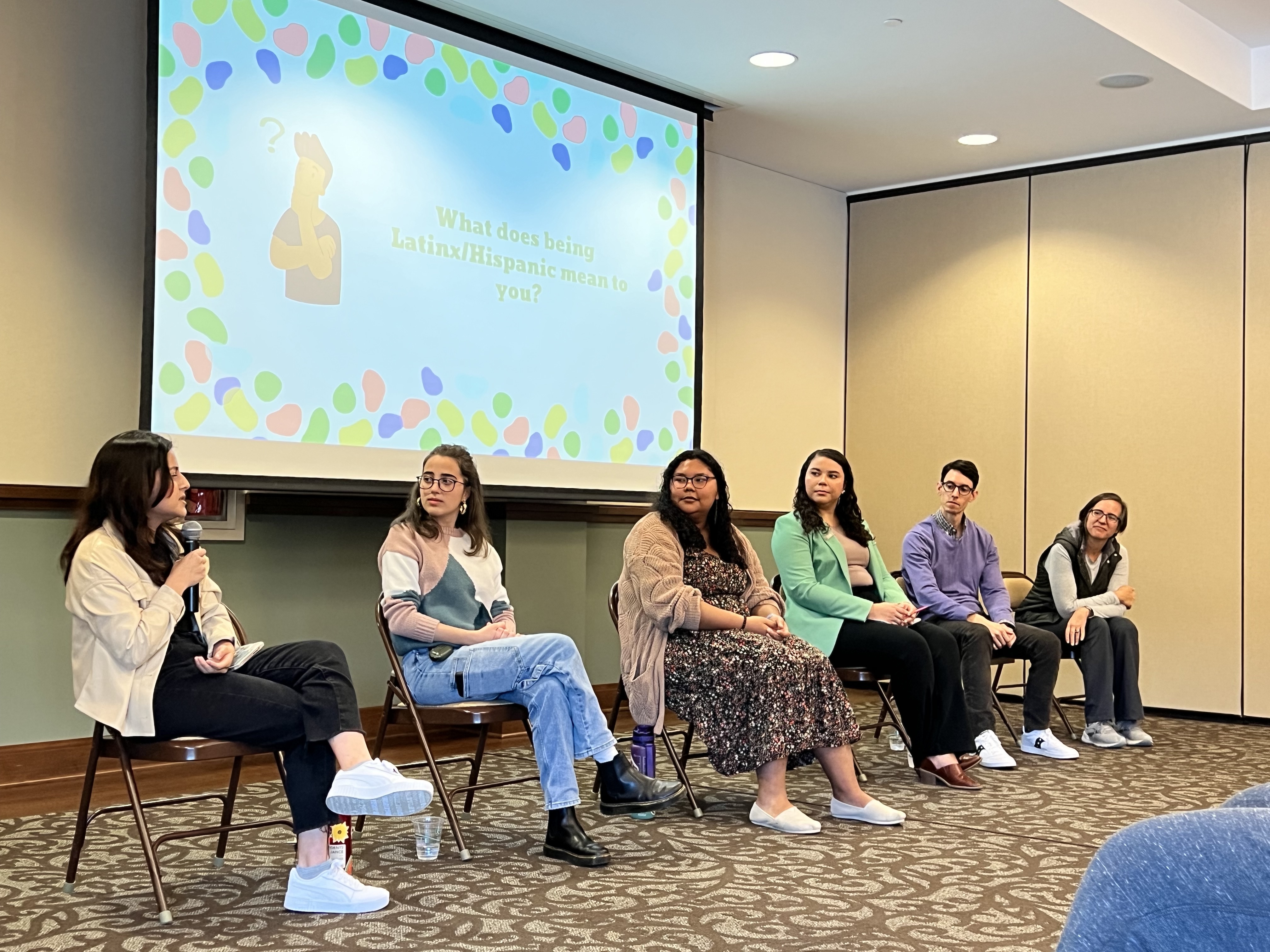The six Elon panelists spoke about the complexity and intersectionalities of Latinx/Hispanic identities as part of this Hispanic Heritage Month event on Tuesday night.
Members of the Elon community gathered in the Lakeside Meeting Rooms on Oct. 11 to learn about the complexities and intersectionalities of the Latinx experience during the “Who Are We?: Latinx/Hispanic Identity Panel.” The event, sponsored by the Center for Race, Ethnicity and Diversity Education, was part of Elon’s Hispanic Heritage Month celebration.
The six panelists — students Karen Cruz-Ruiz ’23 and Valentina Echavarria ’24; staff members Odaly Rivas and Kimberly Romero; and faculty members Tony Reyes and Nina Namaste — discussed what being Latinx means to them, how they navigate other social identities and common issues of wellness that impact the Latinx community.
“One of the reasons we’re doing this identity panel is because as Latinos or Hispanic people, we are constantly being put in a box,” said MJ Larrazabal, assistant director of the CREDE and moderator of the panel. “When we are put in the same box, it creates the assumption that we’re all the same people and we’re really not. Everyone has their own stories or emotions. So, it’s very important to talk about Latinx people as a very diverse group and that’s why we’re here today.”
Immigrating to the United States from Mexico when she was around 4 years old, Karen Cruz-Ruiz ’23 maintained a strong connection with her identity and culture as a Mexican woman. But it wasn’t until she came to college that Cruz-Ruiz said she started developing a better grasp on what it means to be Latinx, how vast the term is and the many intersectionalities it has.
Growing up primarily around individuals from diverse backgrounds and ethnicities, coming to Elon was a culture shock. Although she has managed to develop her own nest of friends with similar backgrounds and cultural understandings, being at Elon has reminded her that she will often have to navigate spaces that don’t have the same shared experiences.
“You’re going to have to go out and explore and really understand what it means to be surrounded by people who don’t have the same views as you, people who shared drastically different experiences,” Cruz-Ruiz said. “Getting acclimated to that has also been important to my identity.”
Kimberly Romero, associate director of admissions for diversity and access, is a Burlington native who lived and worked in Miami before returning to the Alamance County area to join Elon. In Miami, she was able to connect with her culture in a way that wasn’t the case in North Carolina. It was the first time she walked into a restaurant where Spanish was the default language or could pronounce her name as intended and not the Americanized version of it when introducing herself.
When contemplating a return to Burlington, Romero said she was at a crossroads.
“I felt this great passion for my culture and identity and this job, in particular, for recruiting Hispanic and Latinx students to Elon was one that was a little bit conflicting with everything I was experiencing at the time,” Romero said. “But then knowing that I would have to come back here and do some of that legwork to figure out what those resources are looking like now … was something that I had and still have to navigate with a lot of tact.”
The panelists also spoke on what they felt the most common issues of wellness that impact the Latinx/Hispanic community are. Valentina Echavarria ’24 spoke about the difficulties of addressing mental health when the resources and professionals available seldom cater to the needs of people from different cultural backgrounds. She said this a predicament that many people of color face, and when coming from a culture with an already stigmatized view of prioritizing mental health, it can be discouraging for those who take the important step of seeking help.
“It was an alienating experience because I was trying to be vulnerable about a different problem and [the therapist] was fully freaking out about this little thing that is a part of my culture,” Echavarria said. “There’s a lot of stigmas about mental health in our community but then a person who finally gets over that stigma and goes to therapy … have to be prepared to speak with a person from a different culture, it gets a little bit scarier.”
The discussion ended with the panelists sharing what they would want others to know about their Latinx identities. Each panelist discussed living a bicultural life, mixing their backgrounds with navigating a predominantly White environment. Nina Namaste, professor of Spanish, encouraged everyone to welcome that bicultural identity and use it to their advantage.
“I would just encourage you all to embrace your identities. It’s an amazing gift to be bicultural and it’s hard to be bicultural when not everyone else appreciates it,” Namaste said. “It can be an amazing superpower. So, I will just say embrace it, love it. It enriches your life in so many ways.”



